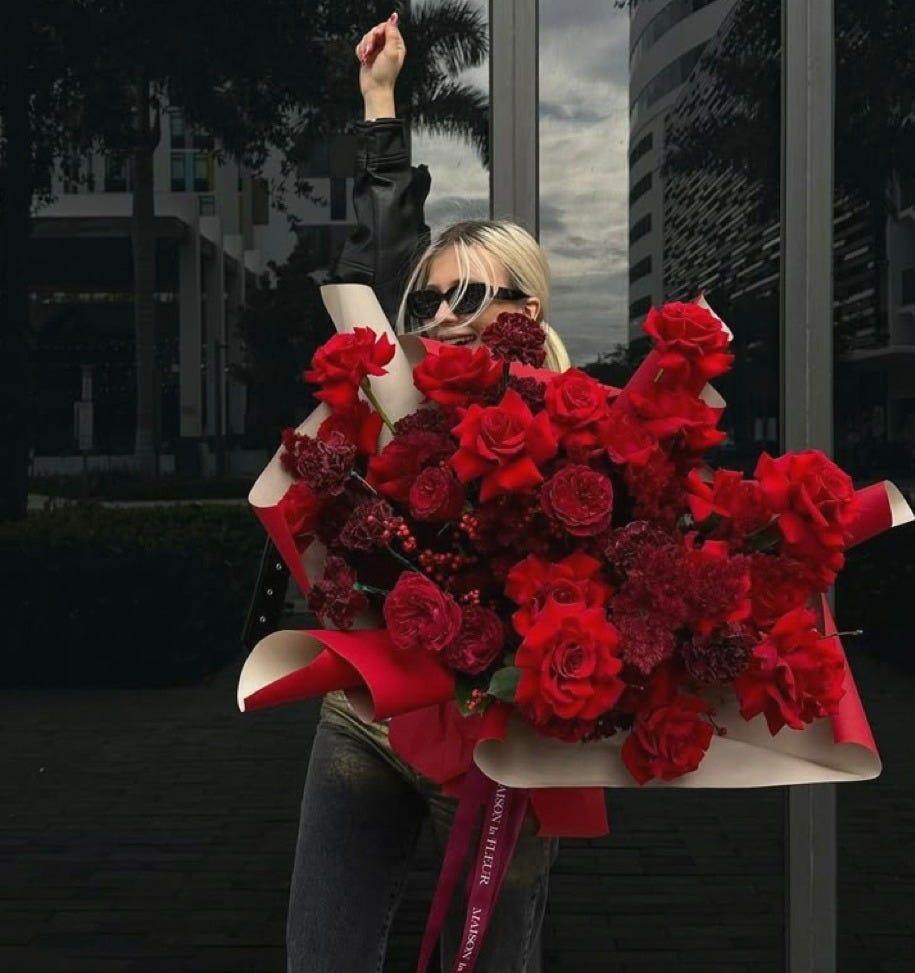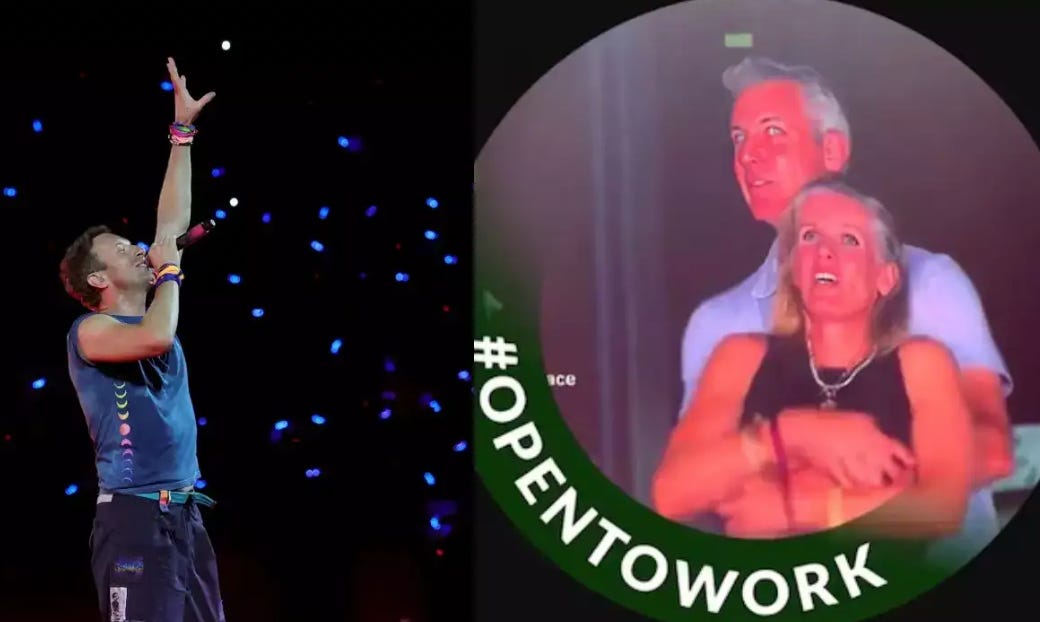Can You Be The Prize Without Being A Possession?
Question for The Culture: Has Your Boyfriend asked you to be his President for Presidents Day? Why's everyone so obsessed with Love Island? Today we're talking consumption and relationships.
After watching Netflix’s Adolescence I have not been able to stop thinking about media consumption impacts our relationships and more broadly the relationship between genders. While this isn't a deep dive on the show(that’s for another time), but rather an examination of what our Digital Diets are really doing to the health of our society.Internet trends packaged as “empowerment” often more misleading than liberating. For young children the biggest threat is in their back pocket, not lurking after the street lights come on…
Let’s Digest!
Your Starter:
The internet has seen consumer trends come and go, some of these trends restructure how we think about ourselves and relationships. Our “Feed” feeds us information, ideas, products— what we consume from this feed impacts our health in more ways than we’d typically think.
From de-centering men to the “Sprinkle Sprinkle” movement, young girls consume more relationship advice, information and expectations than ever before. Is this content driving an imbalance in our diets or is it giving us the tools we need to have healthier relationships on our plates?
Daily I'm inundated with Tiktoks of girls showing off their bouquet of Hundred Long Stem Red Roses, stories of what their boyfriends have gifted them, the places they take them. Let’s get this straight, there is absolutely nothing wrong with this but there seems to be a deeper theme.
Shera Seven started the “Sprinkle Sprinkle” movement, which encourages women to date men who can financially provide.This of course makes sense as advice to women. In a 2018 Ramsey Solution survey over 1,000 adults found that financial disagreements are the second leading cause of divorce, nearly 63% of couples reported that they argued about finances before splitting. So yes, financial compatibility is rather important to the success of a longterm partnership; but not all relationships are partnerships.
My problem with “Sprinkle Sprinkle” content is that it is of course insular but more importantly that it reaches women of all ages, from divorcees re-entering the dating world to girls in high school. Young women see this content and apply it to their lives by creating standards for dating. Oftentimes these standards can’t be applied to their lives without consequence. Hear me out, is it common for anyone college aged or younger to have enough money to support themselves AND their partner? Absolutely not. Can this be true for some yes, but that is the exception not the rule. When young girls are taught their partner must have money and those without money are “dusties” they apply that standard to their male peers, who of course can’t keep up, leading girls to date men who have money… because they are adults with careers not students.
As it pertains to Tiktok, pre-COVID its demographic was young children, these 10 year olds had one social media app and it was Musicly, which later became Tiktok. In 2020, older Gen-Z and Millennials infiltrated their “platform” and brought the Trojan Horse of maturer content, whether that be anti-aging Retinal recommendations or adult advice. We infiltrated their app and it is negatively impacting young people.
While much of this content is made for older audiences with dating experience, social media doesn’t gatekeep—it’s the digital commons, where everyone gets the same feed. The problem is, virality thrives on narrow, myopic retellings. Stories get recycled without nuance, until what’s left are loud tropes rather than lived lessons. The result? Young audiences are handed “plenty of fish” but no tools for fishing; no sense of where to fish, how to fish, why they're even fishing.
The perfect example is the viral story of the 16-year-old boy who stole $2,000 from his mom to buy his girlfriend Fashion Nova and Shein.
For young girls, it plants the seed that being “provided for” is synonymous with love and something that can only be done monetarily. What’s lost is any discussion of the actual nutrients required for a healthy relationship. Instead, a narrow dating model, one few women actually thrive under gets universalized, while the old adage “money talks” gets normalized.
This almost never delves into the reason money is such a focal point of not only our society but the male psyche. Many men move through the world seeking money as a catalyst for power, power over their lives, power over others and most importantly power over the opposite gender. How many times do we see women left to fend for themselves because their husbands cut them off? How many times do we see rich men get away with anything because they have the power to manipulate others? While my thoughts on “Sprinkle Sprinkle” are mixed, I must discuss how money acts as a guise for healthy, caring, fulfilling relationships. Many men know young women depend on them to survive in these types of relationships and they take advantage of that, doing things they likely wouldn't do if they knew the money wasn't enough to make her stay.They throw money at the problem, but what If they're the problem?
Let’s look at some Latto lyrics, because what’s an analysis without rap?
In Latto’s song Prized Possession she raps “I wanted more reassurance, affection, you went and bought me a necklace” before cutting deeper with, “I'm the prize, l'm not a possession”. These lyrics capture a larger truth: when relationships are framed as financial transactions, “providing” can easily blur into a sense of ownership.To be clear I am not making the point that every relationship rooted in financial stability functions thus way (many don’t) but that the cultural script is telling. I am not focused on discussing one couple’s dynamics or the exception to the rule but rather the collective narrative where money is mistaken for love, and provision is confused with possession.
The Main Course:
Why Are We Bingeing on Relationships?
Our society is obsessed with relationships—and just as obsessed with relationship content. They’re always top of mind, always trending, and for good reason (to an extent). If you’ve read my earlier pieces that touch on The Attention Economy, you know our attention is the most valuable currency we have. And nothing captures it faster than love, lust, and heartbreak.
Think about the hamster wheel of virality: Love Island, Love Is Blind, Love on the Spectrum, Too Hot to Handle, Perfect Match—most of IMDb’s top 50 reality shows revolve around romance. Then there’s the internet-native soap operas, like Reesa Teesa’s “Who TF Did I Marry?” or the Coldplay Concert Cheating Scandal- both of which racked up millions of views— turning heartbreak into communal entertainment. Clearly, we’re hooked on consuming and commenting on relationships… especially when they aren’t our own.
I think there are a few things at hand, I’ll start with my more opinion based causations then get into the more studied one.
Keep reading with a 7-day free trial
Subscribe to Consumer Digest to keep reading this post and get 7 days of free access to the full post archives.




